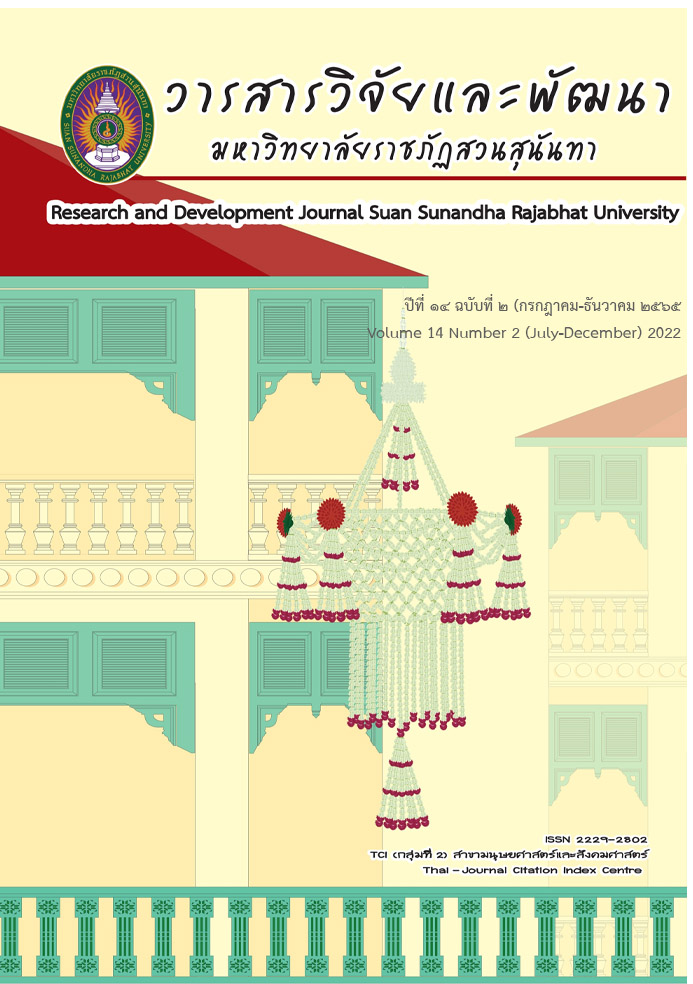มาตรฐานอาชีพ: การเชื่อมโลกของการทำงานกับโลกการศึกษา
DOI:
https://doi.org/10.53848/irdssru.v14i2.257370คำสำคัญ:
มาตรฐานอาชีพ, โลกของการทำงาน, โลกการศึกษาบทคัดย่อ
ปัจจุบันการจัดการศึกษาไม่ใช่เพียงแค่ทำให้ผู้เรียนได้มีความรู้ แต่สิ่งที่สำคัญคือ การทำให้ผู้เรียนสามารถดำรงชีวิตได้อย่างมีความสุข โดยเฉพาะอย่างยิ่งการมีงานทำ ซึ่งเป็นตัวชี้วัดที่สำคัญประการหนึ่งที่จะชี้ให้เห็นถึงความสำเร็จของการจัดการศึกษา โดยเริ่มจากการทำให้ผู้เรียนได้รู้จักการศึกษาเพื่ออาชีพ (Career education) ในทุกระดับชั้น ซึ่งเริ่มตั้งแต่การสร้างความตระหนักรู้ การสำรวจอาชีพ ที่จะต้องให้ผู้เรียนได้เห็นภาพชัดผ่านการจัดการเรียนการสอนในกลุ่มสาระการเรียนรู้การงานอาชีพ เพื่อให้ได้มีความรู้ความเข้าใจในระดับที่สูงขึ้นคือ การสำรวจอาชีพ และการพัฒนาทักษะเฉพาะทางขั้นสูง กระบวนการเหล่านี้จะช่วยสร้างความเข้าใจในเรื่องของโลกของอาชีพให้กับผู้เรียน เพื่อการศึกษาในระดับที่สูงขึ้น หรือการเข้าสู่อาชีพ ในกรณีไม่ได้ศึกษาต่อ ประกอบกับประเทศไทยได้ให้ความสำคัญกับการพัฒนากำลังคนของประเทศในทุกช่วงวัย มีการส่งเสริมการเรียนรู้ตลอดชีวิต จะเห็นได้จากการจัดทำกรอบคุณวุฒิแห่งชาติ ซึ่งมีระดับคุณวุฒิ 8 ระดับ โดยมีผลลัพธ์การเรียนรู้ตามกรอบคุณวุฒิ 3 ด้าน คือ ความรู้ ทักษะ และความสามารถในการประยุกต์ใช้และความรับผิดชอบ ซึ่งเป็นการเชื่อมคุณวุฒิทางการศึกษากับมาตรฐานอาชีพเข้าด้วยกัน โดยพัฒนาคุณภาพมาตรฐานการศึกษาให้เชื่อมโยงกับมาตรฐานอาชีพ ซึ่งเป็นแนวปฏิบัติที่สำคัญที่จะทำให้การจัดการศึกษาของประเทศสามารถตอบสนองต่อความต้องการกำลังแรงงานและทิศทางของการพัฒนาประเทศอย่างยั่งยืน
เอกสารอ้างอิง
Bob, M., & Herman, S. (1999). Methodologies for the development of Competence-based Modular Curicula in VET. Vocational Education and Training Reform in the Republic of Serbia. Phase 2.
Bureau of Academic Affairs and Educational Standards. (2014). Guidelines for measuring and evaluating learning outcomes according to the Core Curriculum of Basic Education, B.E. 2551 (4th ed). Bangkok: Chum Chum Printing Press.Agricultural Cooperatives of Thailand Limited (In Thai).
Hansamorn, K., Thammakittipob, V., & Khemthong, P. (2019). Teaching and Cooperation of Vocational Education Institutions and Businesses in Industrial Cluster Areas Motor vehicles and parts. Journal of Thai-Japanese Institute of Technology: Business Administration and Language, 7(1), 44-53 (In Thai).
Hoyt, K. B. (1974). Career Education: What It Is and how To Do It (2nd ed). Utah: Olympus Publishing Company.
Kasipha, C. (2002). Innovation in vocational education and vocational training into professional qualifications. (Thai Vocational Qualifications-TVQs). Journal of Technical Education Development, 14(41), 3-20 (In Thai).
Kraikrutree, K. (2018). Occupational Standard and Program of Competency based Education for Veterinary Assistants. Vocational Education, Kasetsart University.(In Thai).
Langkratoke, R., Lomarak, T., & Poldej, S. (2018). Problems and guidelines for school administration, evaluation and evaluation. Under the Buriram Primary Educational Service Area Office 3. The 2nd National and International Academic Conference (In Thai).
Lucas, B., Spencer, E., & Claxton, G. (2012). How to Teach Vocational Education: A Theory of Vocational Education. London: The City and Guilds Centre for Skills Development.
Ministry of Education. (2002). The National Education Act, B.E. 1999 and its amendments, B.E. 2002 (Vol. 2). Bangkok: Siam Sport Syndicate Company Limited (In Thai).
Ministry of Education. (2008). Basic Education Core Curriculum 2008. Bangkok: Printing House, Agricultural Cooperative Association of Thailand Limited (In Thai).
Office of the Education Council Secretariat. (2017). Revised National Qualifications Framework. Bangkok: Prikwan Graphic Co., Ltd (In Thai).
Paorohit, N. (1989). Career Development. Bangkok: Department of Psychology Faculty of Education Ramkhamhaeng University (In Thai).
Thammakittipob, W. (2009). Principles and theories in vocational education for systematic development. Bangkok: Department of Vocational Education, Faculty of Education Kasetsart University (In Thai).
UNESCO. (2002). Teaching and Learning for a sustainable Future – a multimedia Teacher Education Programme. Retrieved from www.unesco.org/ edcuation/ tlsf.
Wattananarong, K. (2013). Education for Employment. (Is that the only one). Retrieved December 20, 2013, from https://www.thairath.co.th/ content/ 371432 (In Thai)
ดาวน์โหลด
เผยแพร่แล้ว
รูปแบบการอ้างอิง
ฉบับ
ประเภทบทความ
สัญญาอนุญาต
ลิขสิทธิ์ (c) 2022 มหาวิทยาลัยราชภัฏสวนสุนันทา

อนุญาตภายใต้เงื่อนไข Creative Commons Attribution-NonCommercial-NoDerivatives 4.0 International License.
บทความที่ได้รับการตีพิมพ์เป็นลิขสิทธิ์ของ สถาบันวิจัยและพัฒนา มหาวิทยาลัยราชภัฎสวนสุนันทา
ข้อความที่ปรากฏในบทความแต่ละเรื่องในวารสารวิชาการเล่มนี้เป็นความคิดเห็นส่วนตัวของผู้เขียนแต่ละท่านไม่เกี่ยวข้องกับมหาวิทยาลัยราชภัฎสวนสุนันทา และคณาจารย์ท่านอื่นๆในมหาวิทยาลัยฯ แต่อย่างใด ความรับผิดชอบองค์ประกอบทั้งหมดของบทความแต่ละเรื่องเป็นของผู้เขียนแต่ละท่าน หากมีความผิดพลาดใดๆ ผู้เขียนแต่ละท่านจะรับผิดชอบบทความของตนเองแต่ผู้เดียว





